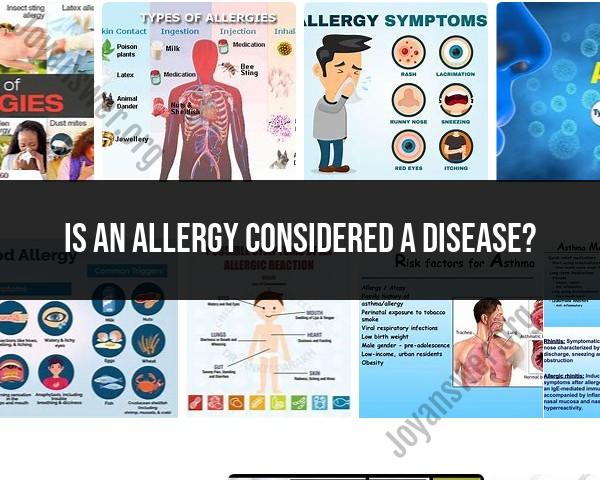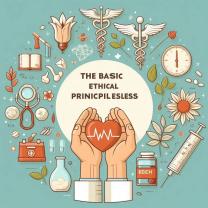Is an allergy considered a disease?
Yes, allergies are considered a medical condition and are often referred to as an allergic disease. An allergy is a specific and abnormal immune system response to a substance (allergen) that is generally harmless to most people. This immune response results in various allergic reactions and symptoms.
Allergic diseases encompass a wide range of conditions, including:
Allergic Rhinitis: Also known as hay fever, allergic rhinitis is an allergy to airborne allergens like pollen, dust mites, and pet dander. It can cause symptoms such as sneezing, runny nose, itchy or watery eyes, and nasal congestion.
Asthma: Allergic asthma is a common type of asthma triggered by allergens. It can cause wheezing, coughing, shortness of breath, and chest tightness.
Atopic Dermatitis (Eczema): This is a skin condition characterized by itchy, red, and inflamed skin. Allergens can exacerbate eczema symptoms in some individuals.
Food Allergies: Food allergies are immune system reactions to specific proteins in certain foods. Symptoms can range from mild hives to severe, life-threatening anaphylactic reactions.
Insect Sting Allergies: Some people have severe allergic reactions to insect stings or bites, such as those from bees or wasps, which can be life-threatening.
Contact Dermatitis: Allergic contact dermatitis occurs when the skin comes into contact with allergenic substances, leading to skin rashes and itching.
Medication Allergies: Allergic reactions to medications can occur, leading to symptoms like hives, itching, or more severe reactions such as anaphylaxis.
Drug Allergies: Some people may have allergic reactions to specific drugs or medications, which can be harmful and require medical attention.
While allergies are considered diseases, they differ from infectious diseases because they are not caused by pathogens like bacteria or viruses. Instead, allergies are immune responses to typically harmless substances. Allergic reactions can range from mild to severe, and in some cases, they can be life-threatening, as is the case with anaphylaxis.
Allergies can significantly impact a person's quality of life, and individuals with allergies often require medical evaluation, diagnosis, and treatment to manage their symptoms and avoid potential triggers. Treatment approaches may include allergen avoidance, medications, immunotherapy (allergy shots), and lifestyle modifications. Consulting with an allergist or immunologist is essential for those with allergies to develop a proper management plan.
Is an Allergy Considered a Disease or a Condition?
An allergy is considered a chronic condition. It is a long-term condition that cannot be cured, but it can be managed with treatment.
Understanding the Nature of Allergic Reactions
An allergy is an overreaction of the immune system to a substance that is harmless to most people. This substance is called an allergen.
When a person with an allergy comes into contact with an allergen, their immune system produces antibodies called immunoglobulin E (IgE). These antibodies attach to mast cells, which are found in tissues throughout the body.
When the IgE antibodies bind to an allergen, they trigger the mast cells to release histamine and other chemicals. These chemicals cause the symptoms of an allergic reaction.
Common Types of Allergies: Environmental, Food, and Insect
There are many different types of allergies, but the most common types include:
- Environmental allergies: These allergies are caused by allergens in the environment, such as pollen, dust mites, mold, and pet dander.
- Food allergies: These allergies are caused by allergens in food, such as milk, eggs, peanuts, and shellfish.
- Insect allergies: These allergies are caused by allergens in insect stings and bites, such as bee stings and mosquito bites.
Are Allergies Genetic? Exploring the Link
Allergies can be genetic. This means that if one or both parents have allergies, their child is more likely to develop allergies as well.
However, not everyone with a genetic predisposition to allergies will develop them. And, it is possible to develop allergies without having a family history of allergies.
Can Allergies Develop at Any Age?
Yes, allergies can develop at any age. However, they are most common in children.
If you think you may have an allergy, it is important to see a doctor or allergist. They can help you identify your allergens and develop a plan to manage your symptoms.













